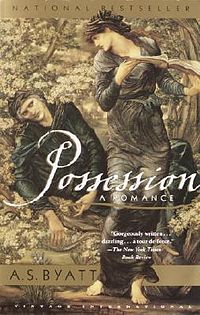- Possession (novel)
-
Possession: A Romance 
First American edition coverAuthor(s) A. S. Byatt Country United Kingdom Language English Genre(s) Novel Publisher Chatto & Windus Publication date 1990 Media type Print (Hardcover and Paperback) Pages 511 pp ISBN 0711032604 Possession: A Romance is a 1990 bestselling novel by British writer A. S. Byatt. It is a winner of the Man Booker Prize.
Part historical as well as contemporary fiction, the title Possession refers to issues of ownership and independence between lovers, the practice of collecting historically significant cultural artifacts, and to the possession that a biographer feels for their subject. The novel incorporates many different styles and devices: diaries, letters and poetry, in addition to third-person narration. Possession is as concerned with the present day as it is with the Victorian era, pointing out the differences between the two time periods satirizing such things as modern academia and mating rituals.
Time Magazine included the novel in its TIME 100 Best English-language Novels from 1923 to 2005.[1]
Contents
Plot introduction
The novel concerns the relationship between two fictional Victorian poets, Randolph Henry Ash (whose life and work are loosely based on those of the English poet Robert Browning) and Christabel LaMotte (similarly based on Christina Rossetti),[2] as revealed to present day academics Roland Michell and Maud Bailey. Following a trail of clues from various letters and journals, they attempt to uncover the truth about Ash and LaMotte's past before it is discovered by rival colleagues.
The use of the Epigraph
In Possession, an epigraph is used to head several chapters, particularly those early on in the book. Byatt uses it as a structural device, primarily for a substrative function, to outline the common themes which formulate in that particular chapter. Each epigraph serves to point the reader to important images or ideas that are going to be expanded upon throughout the chapter.
This is manifest in chapter one, wherein the epigraph is used to introduce the book. As the first thing a reader will see, it serves to incorporate not only those themes primarily used in that chapter, but also themes frequented throughout the novel as a whole.
Plot summary
Obscure scholar Roland Michell, researching in the London Library, discovers handwritten drafts of a letter by the prestigious (fictional) Victorian poet Randolph Henry Ash, which leads him to suspect that the married Ash had a hitherto unknown romance. He feels compelled to take away the documents secretly - an unprofessional act - and begins to investigate. The trail leads him to Christabel LaMotte, a minor poet and contemporary of Ash, and to Dr. Maud Bailey, a modern LaMotte scholar and distant relative of LaMotte's family, who is drawn into helping Roland with the unfolding mystery. They become obsessed with uncovering the truth and unearth more letters and evidence of an affair between the poets, and their own personal romantic lives - neither of which are happy or even satisfactory - develop and become entwined in an echo of Ash and LaMotte, whose story is told in parallel to theirs.
The news of this affair will make headlines and reputations in academia, and colleagues of Roland and Maud become competitors in the race to discover the truth, for all manner of motives. And the truth is this: Ash's marriage was barren and unconsummated, although he loved and remained devoted to his wife. He and LaMotte had a short, passionate affair resulting in the suicide of LaMotte's companion (and possibly lover) and the secret birth of an illegitimate child, whose existence LaMotte sought to conceal from Ash, but whom he did once meet, unknown to her. As the Great Storm of 1987 strikes England, all the interested parties come together in a dramatic scene at Ash's grave, where documents buried with Ash by his wife are believed to hold the final key to the mystery. Reading them, Maud learns that rather than being related to LaMotte's sister, as she has always believed, she is in fact directly descended from LaMotte and Ash's illegitimate daughter, who was raised by LaMotte's sister and passed off as her own child, and she is therefore heir to their correspondence. Roland, freed from obscurity and a dead-end relationship, manages to live down the potential professional suicide of the theft of the original documents, and sees an academic career open up before him. Maud, who has spent her adult life confused and emotionally untouchable, finds her human side and sees possible future happiness with Roland. And the sad story of Ash and LaMotte, separated by the mores of the day and condemned to secrecy and separation, is resolved at last through Roland and Maud.
Awards and nominations
- 1990 Booker Prize
- 1990 Irish Times-Aer Lingus International Fiction Prize[3]
Film adaptation
The novel was adapted into a 2002 feature film called Possession starring Gwyneth Paltrow as Maud Bailey; Aaron Eckhart as Roland Michell; and Jeremy Northam and Jennifer Ehle as the fictional poets Randolph Henry Ash and Christabel LaMotte respectively. The film contains considerable differences from the novel.
References
- ^ http://www.time.com/time/2005/100books/the_complete_list.html
- ^ Parini, Jay (21 October 1990). "Unearthing the Secret Lover". The New York Times. http://www.nytimes.com/1990/10/21/books/unearthing-the-secret-lover.html. Retrieved 25 September 2011.
- ^ 2 Novelists Awarded Fiction Prizes in Ireland: The New York Times, October 6, 1990
External links
- A.S. Byatt discusses Possession on the BBC World Book Club
- Unearthing the Secret Lover: The New York Times review by Jay Parini
- Books of The Times; When There Was Such a Thing as Romantic Love: review by Christopher Lehmann-Haupt
Awards Preceded by
The Remains of the DayMan Booker Prize recipient
1990Succeeded by
The Famished RoadCategories:- Booker Prize winners (books)
- 1990 novels
- Novels by A. S. Byatt
- Metafictional works
Wikimedia Foundation. 2010.
